Not Tonight 2 swaps Brexit for ICE in a blunt, silly satire of the United States
It's about systemic racism and the gig economy... and kicking annoying wizards out of Medieval Times.
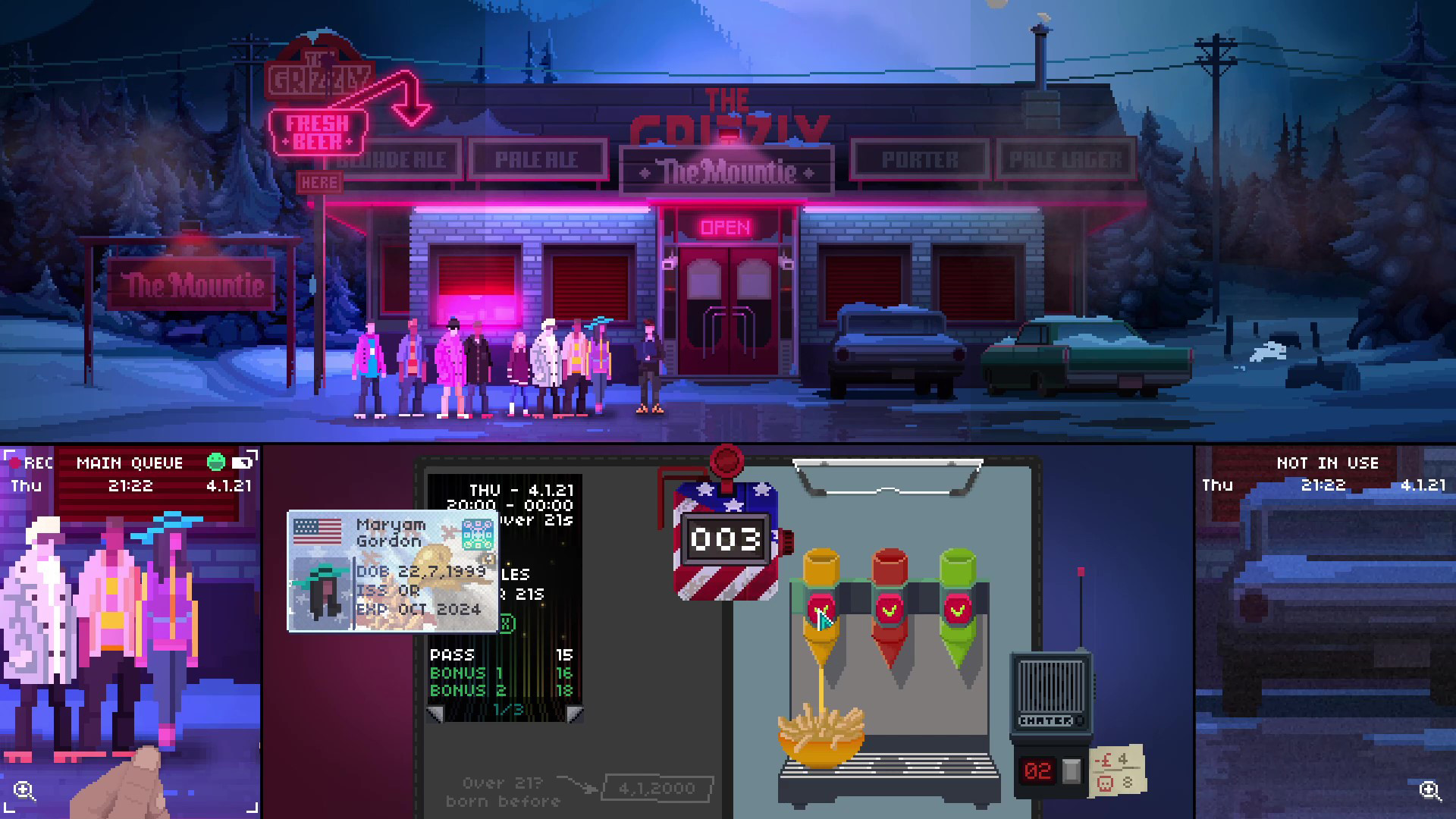
Living in the UK, Not Tonight's message resonated. Right-wing populism has surged here, as it has in many countries this last decade, and while many pin that solely on Brexit, previous signs were present. Not Tonight is set in an alternative post-Brexit Britain where a far-right government came to power as talks with the European Union collapsed, and I played a bouncer trying to avoid deportation for the "crime" of being European. PanicBarn's commentary had the subtlety of a sledgehammer, softened slightly by some dark humour, but it was primarily a strong critique of systemic racism.
It's distinctly British, so crossing the Atlantic felt strange when I started Not Tonight 2's demo. Not Tonight 2 is set in the "United States of America" (yes, that's how it's written) where I was greeted with a submerged Statue of Liberty. This is, again, a game with no interest in being subtle, showing a different way law enforcement can try to "legitimise" that same systemic racism.
And Not Tonight 2 doesn't waste any time making its point: this time we've been imprisoned from the very start.
Not Tonight 2 dives straight into the American issues it has something to say about. Calling this an "alternative" reality where capitalism and political greed broke America—unfathomable, I know—we begin in Seattle on New Year's Eve 2020, as protests continue against a fascist American government. Before long, our friend Eduardo gets arrested by The Martyrs, an immigration enforcement group based on ICE, detained in questionable circumstances as "Immigration Enforcement Case #112."
When Eduardo is taken to the Miami Gulag it's a bleak situation, but not a hopeless one. With 30 days to confirm his citizenship before deportation, Eduardo looks to his three closest friends. Not Tonight 2's narrative then splits three ways: Kevin has to retrieve Eduardo's identification documents, Malik has to confirm his family tree in San Francisco, and Mari stays behind as mission control.
In the full game it's a race to meet Eduardo's deportation deadline, but in the demo I played only Kevin's segment was accessible.
Starting in Seattle, I set out as Kevin to find Eduardo's grandmother is in Canada's recently acquired territory, Montana. After borrowing my mother's car I can't just shoot off without gas money or I'll run out of gas before getting out of sight of the Space Needle.
The biggest gaming news, reviews and hardware deals
Keep up to date with the most important stories and the best deals, as picked by the PC Gamer team.
Much like I did as Person of European Heritage #112 in the first Not Tonight, I spend evenings earning cash as a bouncer, having signed up to the "BouncR" scheme. Regulating who comes into different bars throughout the road trip plays out like the immigration enforcement in Papers, Please. Working shifts whilst Eduardo remains imprisoned presents a fittingly depressing view of the gig economy, though denying obvious chancers entry is amusing.
Tasked with ensuring anyone under 21 doesn't come inside, you'll soon go from only checking a potential patron's date-of-birth to scrutinizing the ID's flag colour, licence expiry date, holographic stamp and more. Success means staying alert for fakes. Passing your shift comes down to how many people were correctly admitted within a time limit, and Kevin receives a bonus for anyone extra. Pressure soon builds, though, as erroneous admissions don't count, and too many mistakes voids your salary. Taking too long assessing an ID risks missing the admission target, too.
To keep life interesting, each region staves off repetition with additional gimmicks. In Montana, a Poutine Relief Act was instituted to welcome Montana's recent integration, mandating each establishment offer a bowl to patrons. Soon everyone trying to get into the bar is handing you a poutine bowl alongside their ID and you have to remember to top them off with the right color sauce, unless they're ineligible for entry anyway.
Over at Mount Rushmore New Camelot, which has become overrun by "medieval lords", one requests your service to ensure "wizards" don't get in.
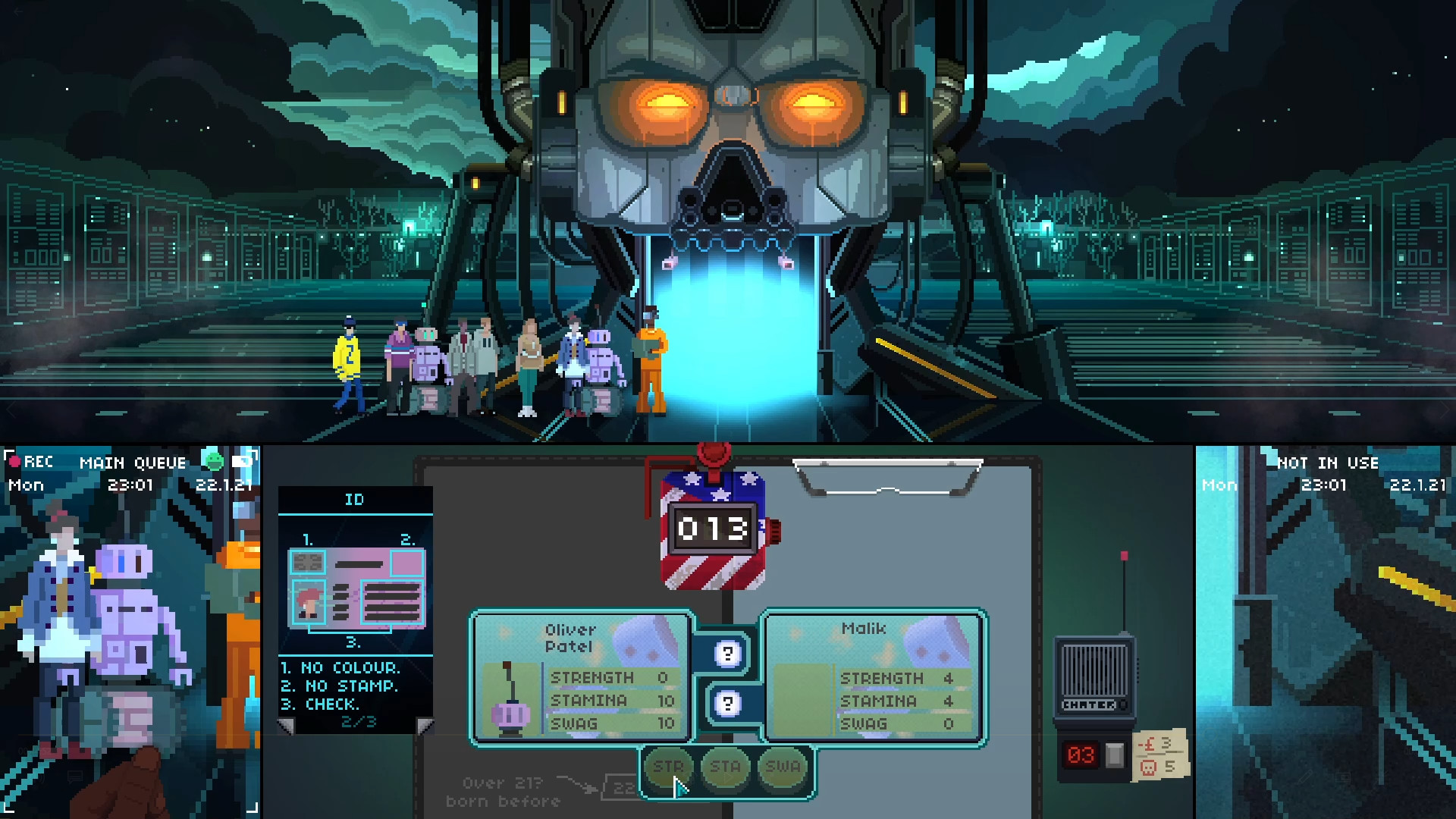
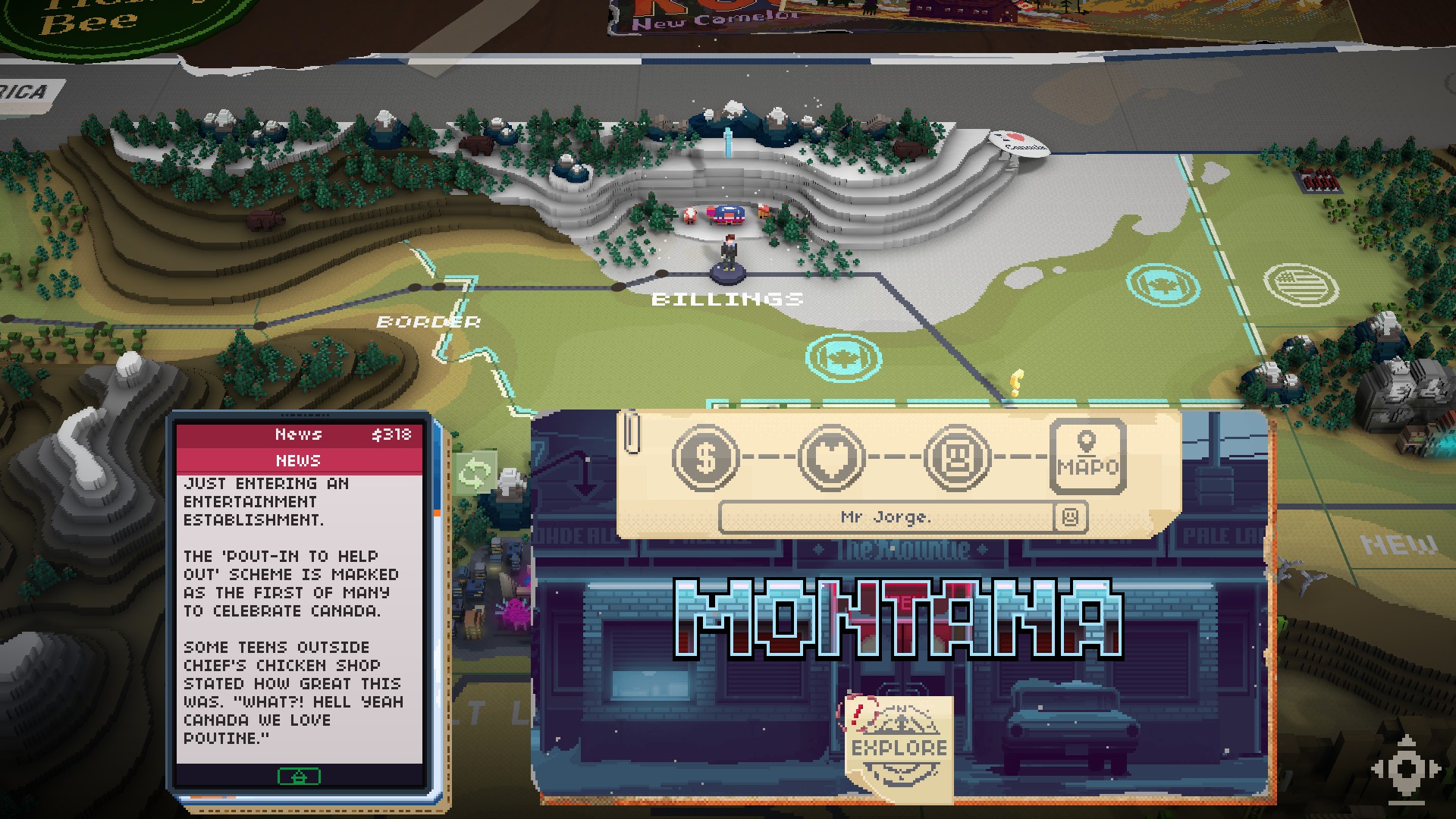
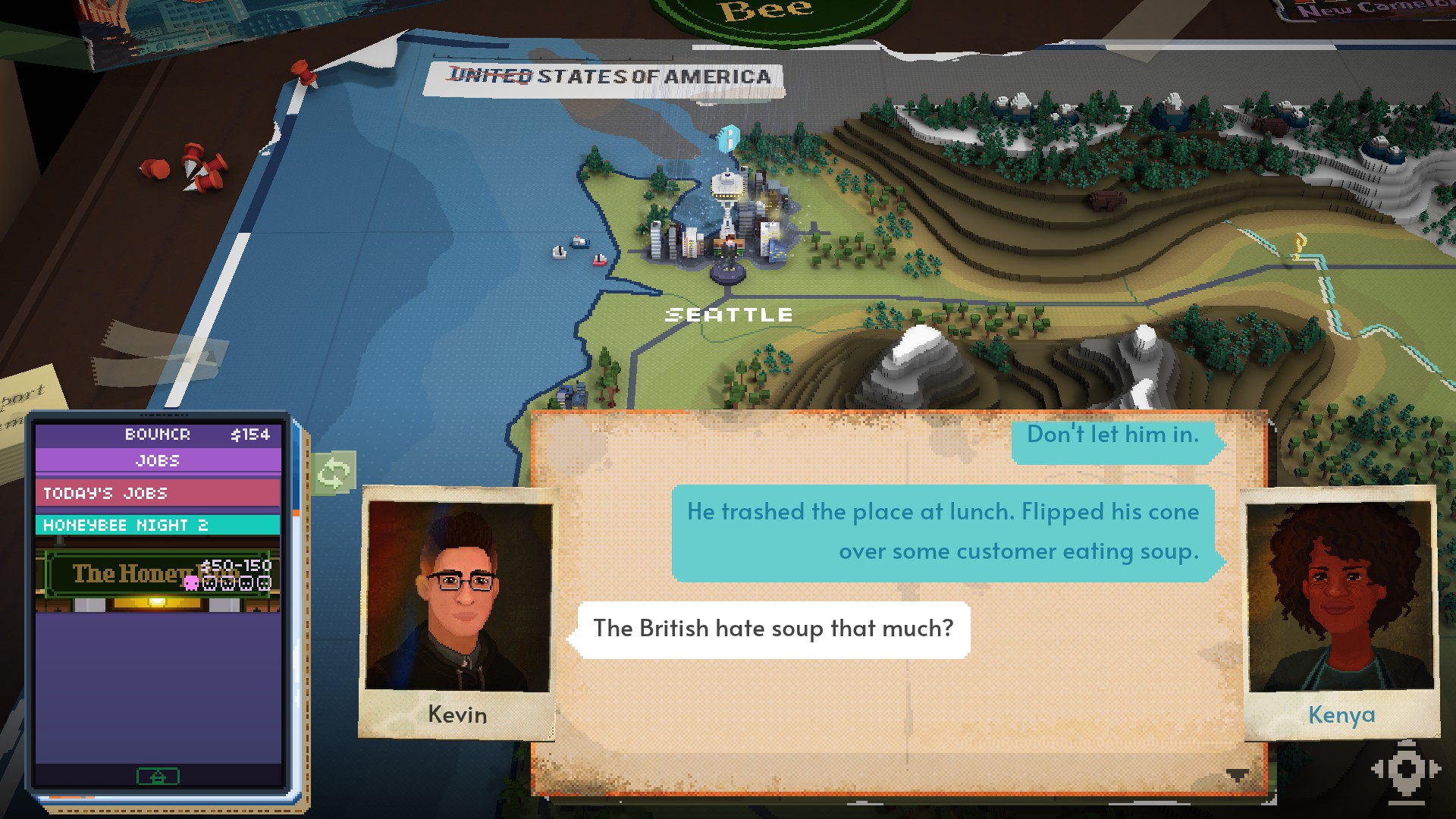
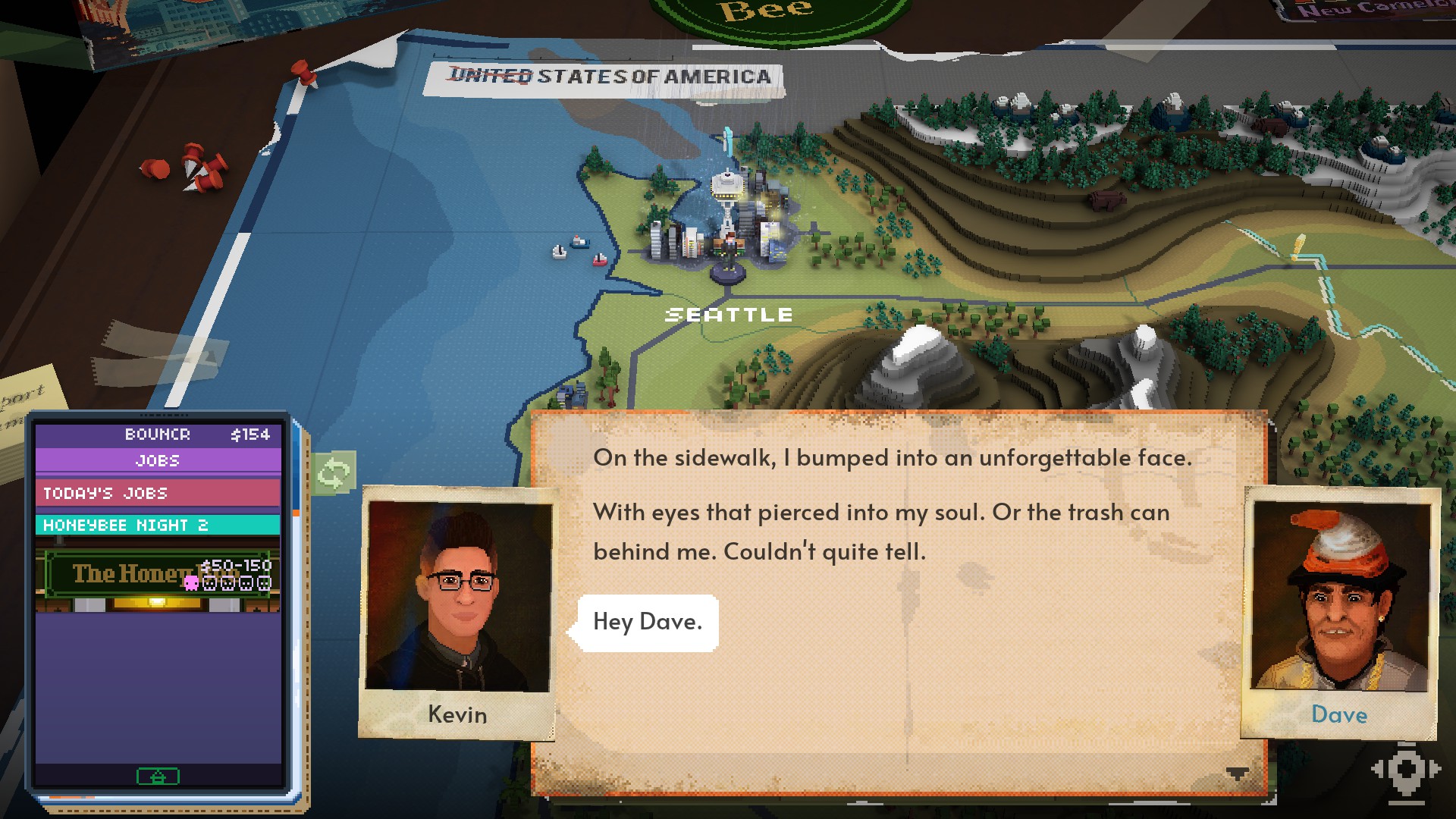
Turning them away at the door isn't enough: some wizards try flying in via balloons, requiring you to shoot them down. It's over-the-top satire, ridiculing current affairs across the country and highlighting Kevin's powerlessness to fix America's real issues. Unfortunately the absurdity lessens how effectively that's conveyed.
Once your shift's up the next day begins, but bouncer work leaves little time for sleep, reducing your health. Thankfully that's recoverable by completing tasks for MapO, a mysterious group dedicated to restoring liberty across America. Those takes are completable during your shift and often require admitting people who'd normally be excluded. That's easy in the demo, but I'm guessing MapO plays a larger and more complex role later on. This demo only scratched the surface about their wider activities.
That intrigue and what I didn't learn about Not Tonight 2 in an hour is a big part of what drew me in. Not Tonight 2 opens strong by showcasing America's decline into right-wing authoritarianism and fascism, paralleling real documented concerns about ICE's abuse of power in recent years. Not Tonight 2 tries balancing these serious issues by injecting humour into the American landscape, so it's not entirely depressing. But that approach does feel inconsistent. There's a significant tonal clash between the game's background and the events which follow. When you've gone from seeing your friend kidnapped to upholding poutine mandates and stopping wizards, all in an hour of gameplay, the cheesiness loses some satirical punch.
Losing sight of Not Tonight 2's wider statement felt easy at times, but that intentional absurdity and sense of humour kept me engaged, so it'd feel harsh to criticize it too much. New Camelot's where the demo ended, and there's a tale of resistance here that's piqued my interest. Tonal consistencies aside, I enjoyed it considerably. By drawing parallels to ICE's practices, PanicBarn's statement is clear—I just hope a more serious tone later in the game can really drive that message home.

